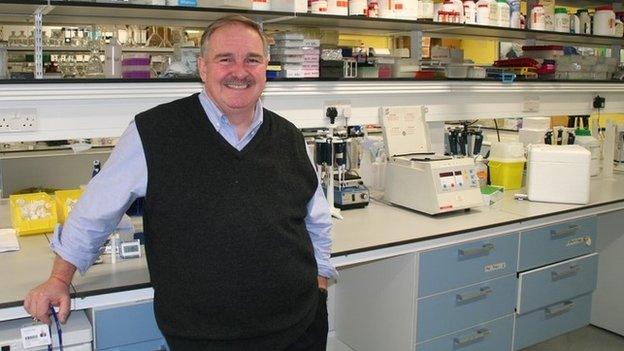The Sober Diaries: Nothing hits the spot
- Published
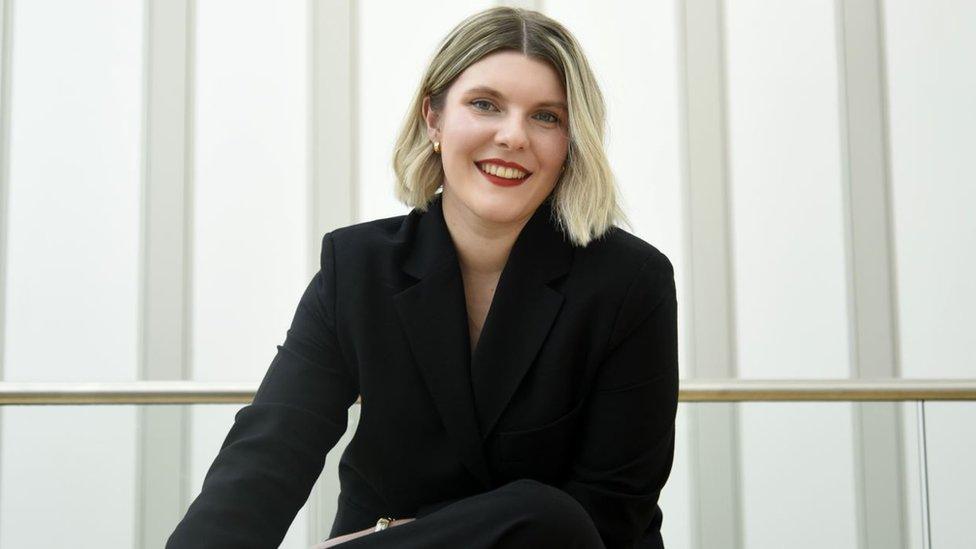
I'm two months into an alcohol-free year and nothing hits the spot. I've been searching for a replacement to a glass of wine and I'm slowly facing up to the reality that there isn't a like-for-like swap.
After giving up booze on New Year's Day, I was determined to maintain my lifestyle.
I found myself in a nightclub and six different pubs in February with the soft drinks ranging from good to disappointing, and I have even ordered an alcohol-free drinks subscription to test some options.
Do I miss alcohol? Yes.
But I'm pig-headed enough to keep going.
We celebrated my partner's birthday this month, and cracked open a bottle of alcohol-free rum for the occasion. We might as well not have bothered. It smelt amazing, all the spice that the real deal promises, but it tasted like water.
And when mixed with juices and soda water for cocktails, it completely disappeared.
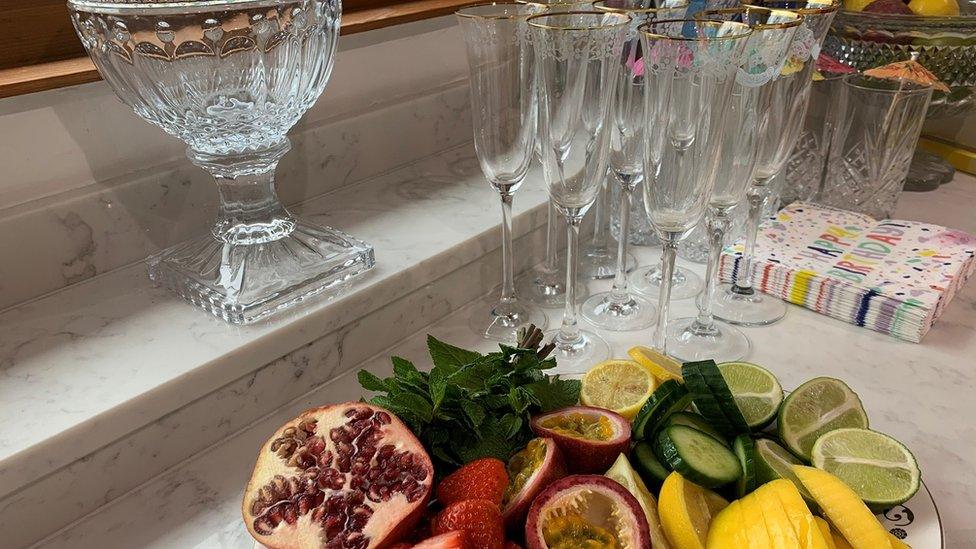
We mixed a non-alcoholic rum with soda water and fruit, but might as well not have bothered
Valentine's Day then rolled around and with it came a new discovery. Alcohol-free and de-alcoholised drinks are not the same.
Often, alcohol-free drinks are made by blending interesting flavours to create an alcohol-like taste, whereas de-alcoholised drinks have gone through the full alcohol brewing process, with the alcohol taken out after.
Some manufacturers are now trying entirely new methods of brewing. So the trick, I have found, is reading the labels on the drinks I'm buying a lot more closely.
While I enjoyed the taste of alcohol, I also enjoyed its benefits - the relaxation and sociability that a drink or two brings.
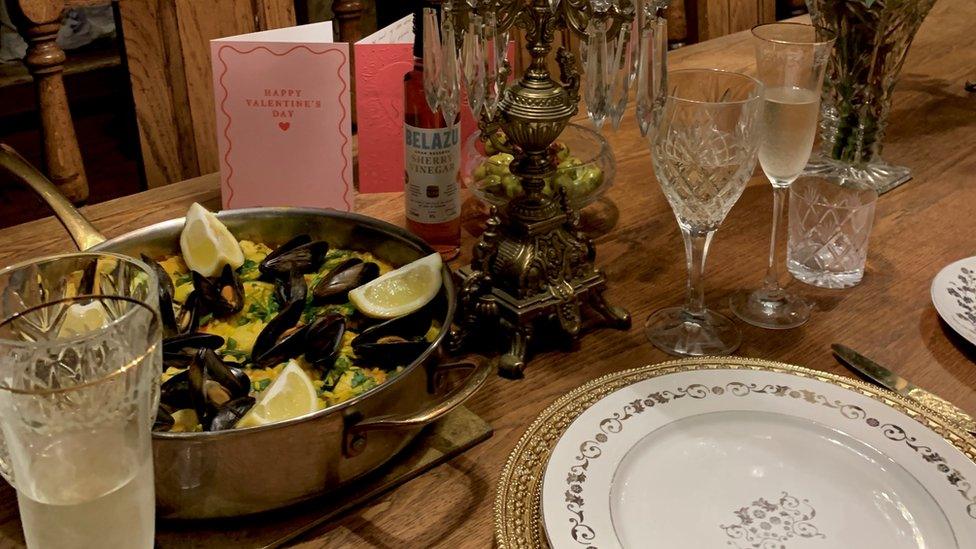
De-alcoholised wine and prosecco gave more of the sharpness I was looking for
Prof David Nutt, director of the Neuropsychopharmacology Unit at Imperial College London and a former government drugs adviser, tells me this is because alcohol enhances gamma-aminobutyric acid (Gaba), a transmitter that increases relaxation and sociability in the brain.
But it also brings on cravings, dependence, memory loss, headaches, hangover, unsteadiness, irritability, violence, nausea and vomiting, and, in the worst case, death.
Prof Nutt has spent the past 20 years working to create an alcohol-free drink that enhances Gaba, but without the negative impact that alcohol can have.
I visited him in his Hemel Hempstead lab, where the research and development work takes place for Sentia Spirits.
'Ultimate social drug'
"What we have done is try to isolate what the target of alcohol is in the brain to produce the effects that most people want most.
"It's a difficult challenge," he admits.
According to the professor, "80% of people who drink, drink because it helps them relax", making alcohol "the ultimate social drug".

Prof David Nutt was the government's top drugs adviser until he was sacked after he ranked alcohol as a more dangerous drug than ecstasy and LSD
"Why we're trying to replace alcohol rather than get rid of it is because most people enjoy drinking," he says.
"So if we could maximise the benefits of alcohol by replacing it with something that gives those benefits and eliminating the harms, then the world will be a better place."
In 2010, he published a research paper on behalf of the Independent Scientific Committee on Drugs, external which stated that alcohol was the most harmful drug in society when considering both harm to oneself and others.
"Evidence has grown that we were correct," Prof Nutt tells me.
"The analysis we did has been replicated by three separate expert groups. And they all come to the same conclusion."
However, he points out that "we turn a completely blind eye to the harms of alcohol because we enjoy it, because it's part of human existence since the beginning of humans".
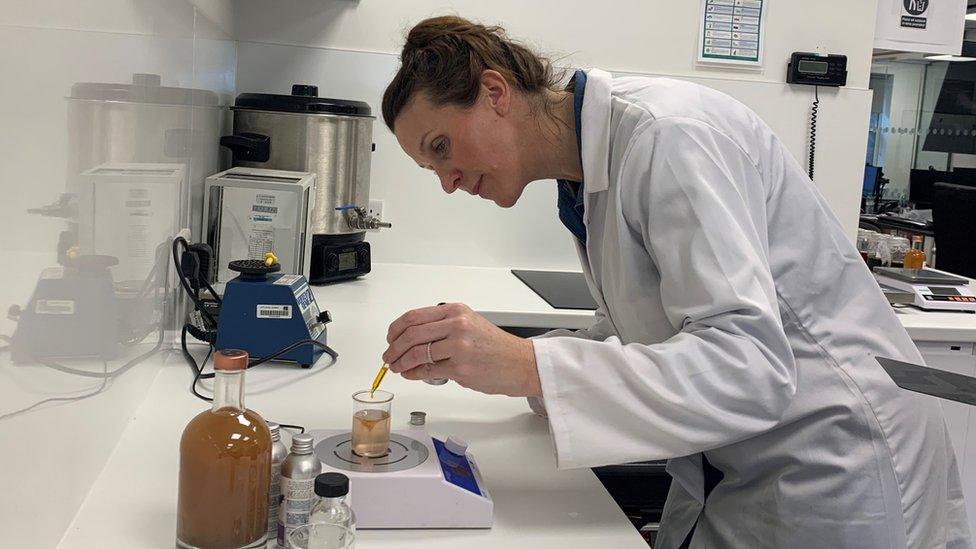
Vanessa Jacoby has been extracting matter from plants to create a drink that enhances Gaba
Prof Nutt says his long-term ambition is to create a singular molecule he has called Alcarelle, which will have the same effect as the Sentia blends.
"It will be an ingredient we can license to any drinks company in the world and they can make any drink they like with it," he says.
"That will give people choice and they can make a rational decision as to whether they take the risks of alcohol."
From our conversation, it sounds as though what I'm looking for is a drink that tastes like wine, gives me the positive buzz that wine does, but doesn't have any of the associated harms.
But it's something I might have to wait a few years for, as research in this field is still progressing.
Vanessa Jacoby, head of liquid development at Sentia, tells me the plants and herbs they use in their blend include rose, ashwagandha and schisandra.
Each plant they use is an approved food or food additive and was chosen because of its ability to enhance Gaba in the brain.
After the right parts are extracted from the plants, work is then done to mix a drink that both looks and tastes good.
"We do a lot here on a small scale so that we can learn as many lessons here, which costs a lot less than when you're manufacturing 2,000 to 3,000 bottles at a time," she says.
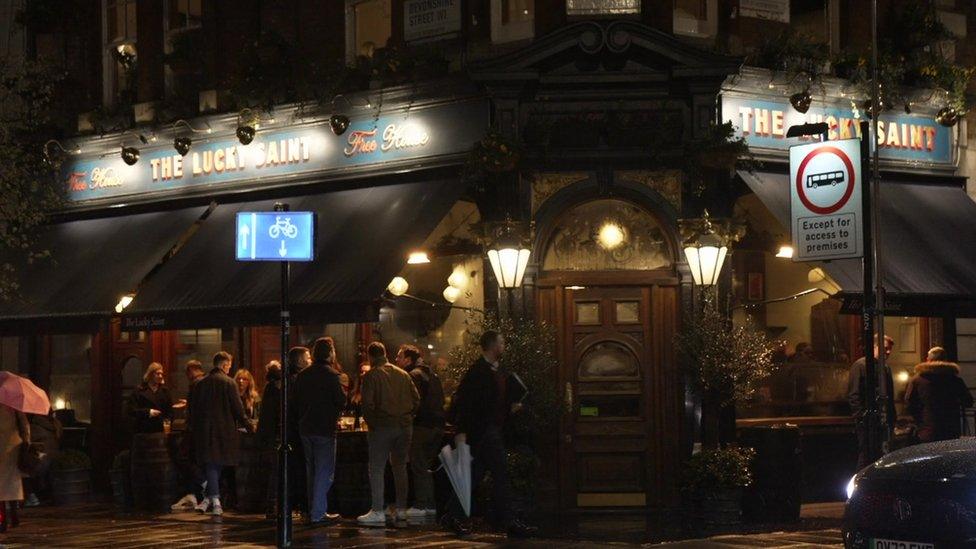
Marylebone pub The Lucky Saint serves both alcoholic and non-alcoholic drinks to make it inclusive regardless of what punters what to drink
So with this option not yet open to me, it's a question of sticking to the conventional alcohol-free and de-alcoholised choices if I want a drink that has a taste of the real thing.
In Marylebone, the alcohol-free beer brand Lucky Saint has taken over a central London pub that had lain empty.
While it appears to be a traditional boozer on the outside, it's a different story behind the bar with the firm claiming to have created a "pub for our times".
Jimmy Adams, who oversees the pub, says the idea behind the venue was to create a place where people could meet regardless of whether they wanted to sup upon alcoholic or non-alcoholic drinks.
"One of the key pillars of our business is being as inclusive as possible," he explains.
"We wanted to make sure that if you came in and you wanted to drink a full-strength product, you were moderating, or you weren't drinking at all, we offered something for everyone."
"We know millions of people take part in Dry January," he adds. "We see them taking that experience and bringing it in through the rest of the year - so their routines and their habits are changing."
I'll be back with more from my Sober Diaries soon but, for now, I'm off to plan my next night out.

Listen to the best of BBC Radio London on Sounds and follow BBC London on Facebook, external, X, external and Instagram, external. Send your story ideas to hello.bbclondon@bbc.co.uk, external
Related topics
- Published31 January 2024
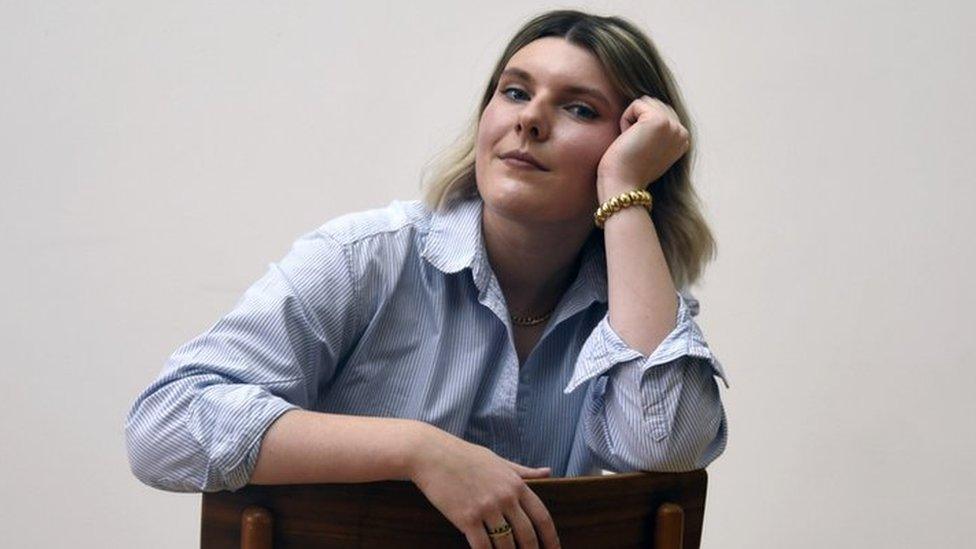
- Published26 September 2016
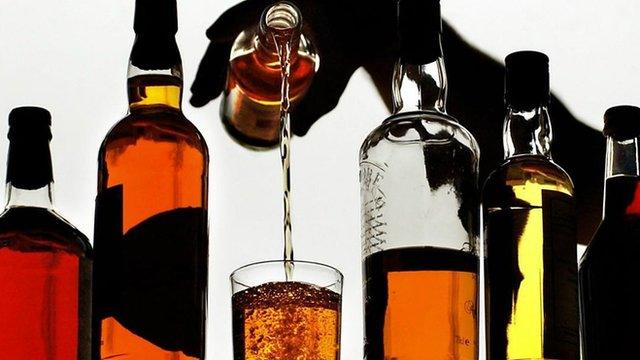
- Published25 April 2014
